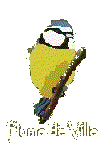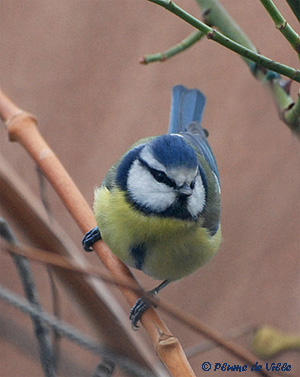Plume de Ville
From day to day.
°°°°°°°°°°°°°°°°°°°°°°° °
December 2008
December 2
Blue sky after many dull, damp and cold days.
Few birds in recent days. Curiously, since it is cold tits are less
present. Whole
days without seeing one. Almost no one around the sunflower in the day.
Very early this morning return with the sun, of two blue tits and a
coal.
The
Swamp
wattle [Acacia retinodes] is in bloom. Legume family, Fabaceae (former
Papillonaceae, was prettier name, isn't?), Genus Acacia.
Originally from southern Australia, also know as Ever-blooming Wattle. It blooms all year but especially blossoms in
spring and autumn. It is
delicately scented.
Its leaves are not true leaves but phyllodes. This is the flattened
petiole in
the form of a persistent "leaf" and adapted to dry climates.
It
likes a
soil neither too dry nor too moist and tolerates calcareous soils.
It retains its flowers even in winter. Well, if there is not deep frost
and the
rain does not rust too much the inflorescences. It tolerates -5
° to -8
degrees.
Last year it was still in bloom at Christmas.
Ph 221108
9 December
Still
grey
and cold.
Little
activity in the balcony. Two blue tits passed early this morning when
it
was still dark.
So
here's a little tits meeting in late November.
A Marsh tit and a Great tit.
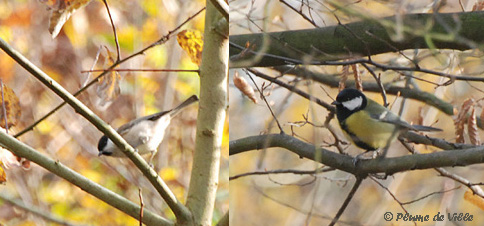
On
its
branch the Marsh tit inspects the lane.
On
the nearby tree a great tit observes it.

The Marsh
tit goes down to pick up the piece she spotted and flies to the nearest
tree to
relish it.
... and the
great tit went down and landed at the place that the Marsh just
quitted, to
inspect the surroundings.
The
Marsh
tit sets to open and enjoy its taking (possibly beech seeds), she holds
firmly
in his claws.
Then its meal finished, it goes down looking for another piece.
The
morsel found, it takes again its place in the branch and the great tit
takes
its place in the lane at the same location.
This little game attracted our attention because it happened
repeatedly. Every
time the great tit came to examine the place where the Marsh had found
something!
A coincidence perhaps, but the recurrence puzzles.
The Marsh tit use to hide quantities of seeds. This behaviour happens
not only in
winter but all year around. It has many caches on its territory from
which it seldom
goes far away.
Then
the Great
tit would have spotted the caches of the Marsh tit?
Examples of
other observers, the sparrows from the balcony are very watchful when a
tit
which can easily peel a sunflower seed. They wait and try to make it
drop its
catch.
The
Marsh
Tit. [Parus palustris - Passeriformes Paridae -]
(Mésange nonette).
The top of its head is
black to
the neck. It belly is grey beige.
A small characteristic black bib under the chin.
Seldom alone. When you see one, it partner or companion is not far
away.
Couples (there are not plumage differences between male and female)
stay
together are said even in winter. They were inseparable and their union
long
lasting. That day, they were also two feeding under the eyes of the
great tit.
I said at the beginning, few birds; but here in the late morning, a blue tit indicating its presence with a few happy titit-tit and just stuck his head through the entrance to the nest. First time in this late fall.
In the afternoon it even greyer, it falls very wet snow. Two blue and
two great
tits spend a good time at the sunflower feeder under the snowy rain.
11 December
Always
cold, 1-2 this morning.
But the sun is here in the morning.
There have been a lot of days that I didn't saw the sparrows looking
the sunrise
at their usual place.
Small
crossing this afternoon, of a nearby park to see that a thin layer of
ice
covers the water.
Black-headed Gulls which which lost their cap in
winter and have just a
small black spot
behind the eye.
Parc
Montsouris.
The grey heron sleeps in the shade under a beautiful blue grey duvet.
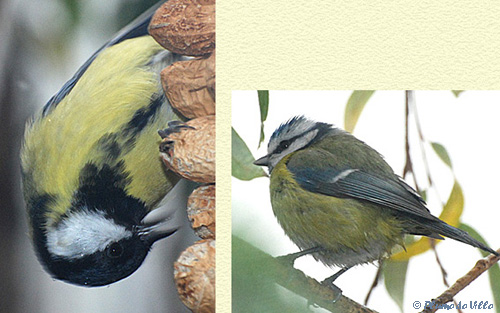
Monday
the
small visitors were wet under the snow showers.
The light was not very good, neither the pictures!
At the moment we very seldom see them.
Not a lot of birds also in the park.
12 December
8:15
passage of a small blue under an all grey sky. It is cold this morning
and it
freezes, no wind or rain
Each one its preferences, the blue prefers sunflower, the great tastes
the fat ball
recently installed.
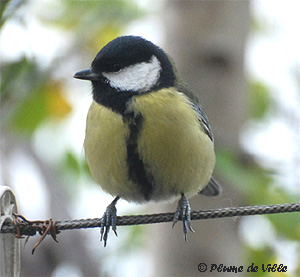
Relaxed the
great tit! Admire my long fingers just placed on the wire balancing
loosely.
And
of
course when they are together, there are sometimes arguments. The blue
charges
the great tit several times. The toughest is the smallest, the blue,
who owns
and defends his territory without being daunted.
For
me, a
good cool sip!
13 December
Very cold
weather, -1°C in the morning. We must break the ice in the
trough and add hot
water.
Rain and snow. A blue tit passed several times today.
14 December
5°C
this
morning, it is uniformly grey under the rain.
The blue tit returns and remains long time on the balcony. It will
explore
everything.
And it sings. Of course it is not yet the songs of spring but a muted
voice lower-pitched
than the spring tit-itit.
A small
tour at sunflower feeder.
A careful
inspection of future buds of the birch. Hey! do not eat all before fine
days!
A
small
detour by the pansies fruits containing small seeds.
Finally,
I think that it the seeds witch interest it, unlikely that it is an
insect.
I
have also seen the Sparrows peck pansies fruits.
And today, inquisitive,
it has just explored the entrance to the nest.
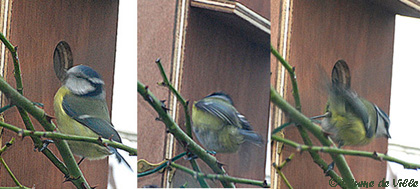
16 December
Like
yesterday, always cold (1-4 °C) and always grey.
The
blue
tit is very visible now.
We
often see it. And it will occasionally stick his head in the nest.
Male
or
female? There is little or no difference in coat between the two.
Superb blue cap. What would rather mean male. It seems that males have
a cap of
a darker and brighter blue. Normally it is the male who looks for a
place to
nest and submit it to an expected companion.
We'll
see.
It
has a small blue line above the right eye that allows identifying it.
18 December
Same thing:
grey, mist, cold (2-6°C) and rain.
Purple-Leaved Sage.
[Salvia officinalis 'purpurascens' Lamiaceae]
(Sauge pourpre)
Perennial, it keeps company to pansies during the winter and protects
them a
little from bad weather. Its dark leaves are beautiful and good in
winter as in
summer. Small blue-violet flowers in early summer.
A visit to "lac
des Minimes" gave
us a nice moment in the gloom.
The
Kingfisher.
It
perched for a moment over a small stream almost dry at this time of
year,
which feeds the lake.
Not very good the photos, taken from a distance and by grey weather,
but at
moment we do not dare move! Nor for the settings and even less to
approach.
Then it took off like an arrow into the trees.
Bright colours,
but it is not so easy to notice. This one perched a moment to show his
brilliant orange belly but from a distance and under cover, it was not
visible.
Fortunately, it perched on a clear branch and appeared as a reddish
brown stain
the size of a starling.
They feed on small fish caught in water. It is essential to him that
the river
or lake does not freeze. Very cold winters are very difficult for him.
Common
Kingfisher. [Alcedo atthis coraciiformes-Alcedinidae-]
Martin-pêcheur d'Europe. Size 16cm (less than starlings),
wingspan25cm.
Greatly enlarging the pictures, it seems that it is a male. Its beak is
black;
the female has the lower part of the beak orangish.
It was also
observed in Paris (where they nest) on the banks of the Seine and in
some
parks.
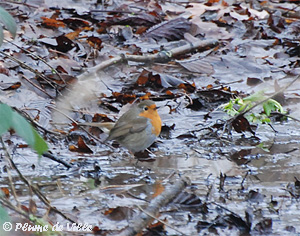
And as I
like it before the frozen background, this is the European robin.
And the
others ...
Many mallards, coots, moorhens, the pair of swans and 4 well developed
cygnets,
Canada geese, the Bar-headed goose that accompanies them, the two
Common
Shelducks, a half-dozen cormorants, 6 herons and, of course,
black-headed gulls.
Bands of chaffinches and blue tits and great tits. But no Slavonian
grebes nor Common
Pochards that were there in late November..
Le 12 12 3008. Lac des Minimes (Bois de
Vincennes) .
19 December
24 December
In
recent
days, the couple of blue tits has been increasingly present. That's a
couple;
they come together, he sings.
They remain set on the balcony. Often, one sticks a small head through
the door
of the nest box.
Yesterday, it was beautiful, sunny, a gentle temperature (11
°C) and, at 11 am,
the first entry in the nest! We were not there, but the camera motion
detection
took pictures for us of this first visit. I hope that they liked the
housing.
A small tour of one minute, with a lot of time hanging at the entrance.
And a
little "fan" (top photo) to have a good measure of the size of the flat
(?).
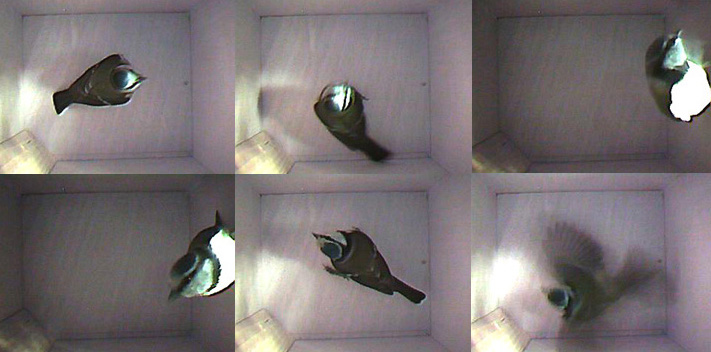
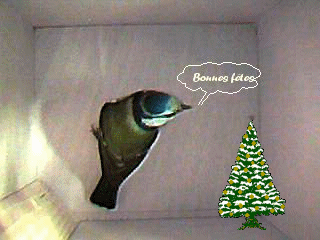
30 décembre
These last days, time was a bit short to write this diary on a
daily basis. Time passed also to make some preparations for
the nest box camera.
The installation was amended this year and is still in testing.
But the camera is activated and awaits visitors.
Very cold in recent days of the year, frosts, but often under
the sun.
This morning, black ice. It's raining on the frozen ground under a gray
sky. In late afternoon, a few snowy.
This is a couple that visits us.
Here, the 24, early in the morning in the sun, one near each other.
They spent a long time to fly from branch to branch and to seek a
delicacy in the birch.
Since 23, no entry in the nest, just a few passages of a blue tit hung
at the entrance.
As usual when it's colder weather there are fewer birds. The time is
not fine to visit the homes.
With the cold, the feather mantle is inflated
He sings from time to time when the sun is here.
One of the two tits is the same as the 16, one in blue eyebrow. Other photos show a small blue line over the right eye.
On 23, a visitor from another type. The common kestrel which visit my balcony is again passed through there. This time he left his portrait ... I will show it very soon.
Meet you next year!
